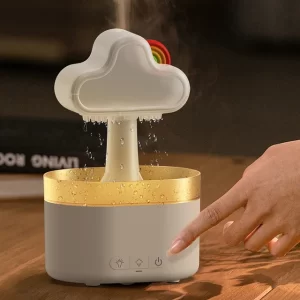Is a humidifier or air purifier better for a cough?
Introduction
When experiencing a cough, finding relief is essential for comfort and well-being. Two popular devices often considered for cough management are humidifiers and air purifiers. While both devices offer unique benefits, it is important to understand their differences and how they can address specific causes of cough before making a decision. In this guide, we will explore the benefits and limitations of humidifiers and air purifiers in alleviating cough symptoms and provide insights to help you choose the most suitable device for your needs.
Is a humidifier or air purifier better for a cough?
I. Understanding Cough and Its Causes
-
Types of Cough:
- Coughs can be caused by various factors, including respiratory infections, allergies, dry air, pollutants, and irritants.
-
Dry Air and Irritation:
- Dry air can exacerbate cough symptoms and cause irritation in the respiratory passages. Dryness can occur during colder months with indoor heating or in arid regions.
-
Allergens and Irritants:
- Allergens such as pollen, pet dander, and dust mites, as well as irritants like smoke and chemicals, can trigger cough symptoms.
II. The Role of Humidifiers
-
Moisture for Soothing Cough:
- Humidifiers increase moisture levels in the air, which can help alleviate cough symptoms caused by dryness and irritation in the respiratory system.
-
Benefits of Humidifiers:
- Properly humidified air can soothe dry throat, reduce throat irritation, and ease congestion, leading to relief from cough symptoms. Increased humidity can also help prevent the drying of mucus membranes.
-
Types of Humidifiers:
- Different types of humidifiers are available, such as evaporative, ultrasonic, and steam humidifiers. Each type operates differently but serves the common purpose of adding moisture to the air.
III. The Power of Air Purifiers
-
Removing Allergens and Irritants:
- Air purifiers are designed to filter out allergens, particles, and irritants from the air, reducing their presence and potential impact on respiratory health.
-
Benefits of Air Purifiers:
- By capturing and removing airborne allergens and irritants, air purifiers can help alleviate cough symptoms caused by environmental triggers. They can improve indoor air quality and create a cleaner, healthier breathing environment.
-
Types of Air Purifiers:
- Air purifiers utilize various filtration technologies such as HEPA filters, activated carbon filters, or electronic methods to capture and remove harmful particles from the air. Different types address specific contaminants and have varying levels of effectiveness.
IV. Assessing Your Needs
-
Identifying the Cause of Your Cough:
- Understanding the underlying cause of your cough is crucial in selecting the appropriate device for symptom relief. Consider factors such as dryness, allergens, pollutants, or irritants in your environment.
-
Dryness and Irritation:
- If your cough is primarily caused by dry air and irritation, a humidifier may be more effective in providing relief by adding moisture to the air.
-
Allergens and Irritants:
- If your cough is triggered by allergens or airborne irritants, an air purifier can help by reducing their presence in the air and creating a cleaner breathing environment.
V. Combination Approach
-
Addressing Both Dryness and Allergens:
- In some cases, a combination of a humidifier and an air purifier may be beneficial. This approach can provide relief by ensuring both optimal humidity levels to soothe dryness and reduced presence of allergens and irritants in the air.
-
Compatibility and Placement:
- When using both devices simultaneously, ensure they are compatible and placed strategically to avoid interference. Proper placement can optimize the effectiveness of both the humidifier and air purifier.
VI. Maintenance and Care
-
Regular Cleaning and Filter Replacement:
- Both humidifiers and air purifiers require regular cleaning and maintenance to ensure optimal performance. Clean and disinfect humidifier tanks to prevent mold or bacterial growth, and replace air purifier filters according to the manufacturer’s instructions.
-
Follow Manufacturer Guidelines:
- Adhere to the specific cleaning and maintenance instructions provided by the manufacturer of your humidifier and air purifier to ensure their longevity and effectiveness.
VII. Consulting with Healthcare Professionals
-
Seeking Medical Advice:
- If your cough persists, worsens, or is accompanied by severe symptoms, consult with a healthcare professional. They can help identify the underlying cause of your cough and provide appropriate guidance for symptom management.
-
Allergy Testing:
- If allergies are suspected to be a significant cause of your cough, consider seeking allergy testing to identify specific triggers and develop a comprehensive approach to symptom relief.
IX. Cost Considerations
-
Cost of Initial Purchase:
- When comparing the cost of humidifiers and air purifiers, consider the initial purchase price. Prices may vary depending on the brand, type, features, and size of the device.
-
Operational Costs:
- In addition to the initial purchase price, factor in the operational costs associated with using the device. Humidifiers require regular refilling with water, while air purifiers may require filter replacements periodically. Consider the long-term costs associated with these ongoing maintenance requirements.
-
Energy Consumption:
- Take into account the energy consumption of the device. Some humidifiers and air purifiers may consume more energy than others. Look for energy-efficient models that minimize electricity usage and reduce your utility bills over time.
X. Personal Preferences and Living Conditions
-
Noise Levels:
- Consider the noise levels generated by the device, especially if you plan to use it in a bedroom or other quiet areas. Some humidifiers and air purifiers operate quietly, while others may produce more noticeable noise. Ensure the device aligns with your preference for a peaceful environment.
-
Size and Portability:
- Evaluate the size and portability of the device, particularly if you intend to use it in multiple rooms or need to transport it frequently. Compact and lightweight options may be more suitable for versatility and convenience.
-
Aesthetic Appeal:
- Consider the design and appearance of the device, especially if it will be visible in your living space. Look for models that complement your decor and blend seamlessly with the surrounding environment.
VIII. Conclusion
Humidifiers and air purifiers offer distinct benefits in cough management by addressing different triggers and causes. Humidifiers are effective in adding moisture to alleviate symptoms related to dryness and irritation, while air purifiers help reduce allergens and airborne irritants that can trigger cough. Assessing the underlying cause of your cough is crucial in choosing the right device for symptom relief.
In some cases, a combination of both a humidifier and an air purifier may be beneficial to address multiple triggers. Proper maintenance and cleaning are essential to ensure optimal performance of both devices.
Consulting with healthcare professionals and allergists can provide additional guidance in understanding the cause of your cough and developing a comprehensive approach to symptom management. By evaluating your specific needs and selecting the appropriate device, you can find relief from cough symptoms and create a healthier indoor environment.

